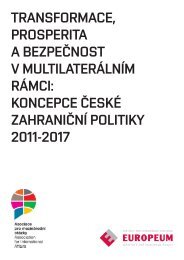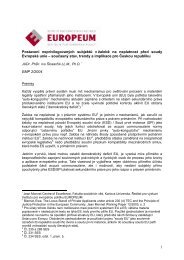eu constitutionalisation - EUROPEUM Institute for European Policy
eu constitutionalisation - EUROPEUM Institute for European Policy
eu constitutionalisation - EUROPEUM Institute for European Policy
Create successful ePaper yourself
Turn your PDF publications into a flip-book with our unique Google optimized e-Paper software.
Chapter 5: The <strong>European</strong> Constitution and the Re<strong>for</strong>m of External CompetencesThe Nice treaty inserted another title in the field of cooperation policy,governing economic, financial and technical cooperation with third countries(Art 181a TEC). It codified a long standing Community practice ofconcluding cooperation agreements or including cooperation provisionsin general agreements with non-developing countries, which until thenhad to be based on current Art 308 TEC.⁷⁴ In terms identical to Art 177(2)TEC, Art 181a TEC is also designed to contribute to the general objectiveof developing and consolidating democracy and the rule of law, and tofurther the respect <strong>for</strong> human rights and fundamental freedoms. Yet, incontrast to Art 177 TEC, it specifically addresses the cooperation with countriesor regions other than developing countries, including industrialisedcountries. The subject matter of such cooperation in the treaty is definedin broad terms and, as Eeckhout sets out, removes the need <strong>for</strong> recourseto different Treaty provisions depending on the subject of cooperation.⁷⁵Nevertheless, to the extent that such measures fall under the scope ofother Community policies, in particular to the common commercial policy,the more specific legal basis prevails.⁷⁶ An exclusive Union competenc<strong>eu</strong>nder the CCP would, <strong>for</strong> example, continue to exist to the extent thatCommunity measures pursuing development objectives have as an essentialgoal to determine commercial or agricultural policy.⁷⁷Through the introduction of a common set of objectives, the emphasisto extend the Union’s cooperation, and particularly development policyobjectives to all fields of external action has become even more explicit (Art.III-292(2) CT). This applies particularly to the respect <strong>for</strong> human rights,democracy or the rule of law which frequently is a condition <strong>for</strong> financial oreconomic assistance in development or trade agreements with third countries.Yet, also the fostering of “sustainable economic, social and environmentaldevelopment of developing countries” (Art. III-292(2) lit d CT) explicitly ranksamong the general objectives of the Union’s external action. These com-74) Compare, <strong>for</strong> example, Council Regulation (EC) No 2698/2000, OJ L 311/1 amending Regulation (EC) No1488/96 on financial and technical measures to accompany (MEDA) the re<strong>for</strong>m of economic and socialstructures in the framework of the Euro-Mediterranean partnership, as well as Council Regulation 443/92,OJ L52/1 governing financial and technical assistance and economic cooperation with the developingcountries of Latin America and Asia (ALA).75) An agreement providing <strong>for</strong> technical cooperation in matters of transport, environmental protection andagriculture, <strong>for</strong> example, does not need to be based on the express or implied external powers in thoseareas (EECKHOUT (2004), p.117).76) MARTENCZUK (2002), p. 407.77) SCHMALENBACH (2002), ad Art 180 para 1 and Art 179 para 3; C-268/94, Portugal versus Council, ECR1996/I-6177, ad para 39.178Chapter 5: The <strong>European</strong> Constitution and the Re<strong>for</strong>m of External Competencesmitments <strong>for</strong> the future implementation of the Union’s external action, aswell as the further extension of competences in cooperation policy appearto aim at an enhanced Union engagement in this field.⁷⁸V.4.2. The New Provisions of the Constitution on the Cooperation withThird Countries and Humanitarian AidBoth Art 177ff TEC and Art 181 TEC stipulate that the Communitypolicy in the sphere of cooperation policy shall be “complementary to thepolicies pursued by the member states”. Yet, despite this clear wording in thetreaty, Community measures in the field of development cooperation inpractice go beyond a mere coordination of member states’ policies. Asthe Convention’s Working Group on “Complementary Competences”observed, the preferred legal instrument <strong>for</strong> Community action in developmentcooperation is regulations, which would under the definition chosenimply shared competence. The group, however, also stated that developmentcooperation has special features because Union activities in this field would neverpre-empt the competence of the member states to maintain their own national developmentpolicy. It is thus presupposed that member states would continueto pursue their own development policies⁷⁹.The constitutional treaty takes account of this specific nature of the Union’sdevelopment policy. Art. I-13 CT categorises development cooperationand humanitarian aid as shared competences. At the same time, it providesthat the exercise of Union competence in this field to take action andconduct a common policy may not result in member states being preventedfrom exercising theirs (Art. I-13 para 4 CT). The principle of pre-emption,normally inherent in the context of shared competences, does not applyin these areas. Consequently, Art. III-316 in Part III of the Constitutionstipulates that the Union’s development cooperation policy and that ofthe member states shall complement and rein<strong>for</strong>ce each other and thatthe Union’s external powers in the field do not prejudice the memberstates’ competences to negotiate in international bodies and to conclude78) Compare Working Document 29 of Working Group “Complementary Competences”; similar SCHMALENBACH(2002), ad Art 180, para 1; compare also ZIMMERMANN and MARTENCZUK (2000), ad Art 177 (in Schwarze,EU-Kommentar, Baden/Baden, 2000), para 14.79) CONV 375/1/02, REV 1, p.9, compare also Working Document 29 of Working Group “ComplementaryCompetences”, where it is proposed that development policy, as a sub-category of shared competencecould be parallel competence; compare also SCHMALENBACH (2002), ad Art 180, para 1; see alsoZIMMERMANN and MARTENCZUK, B. (2000), ad Art 177, para 14.179








